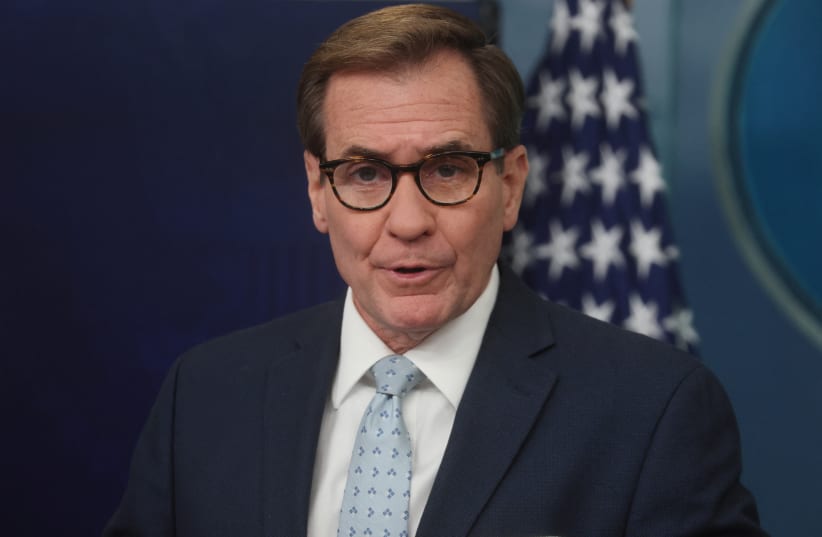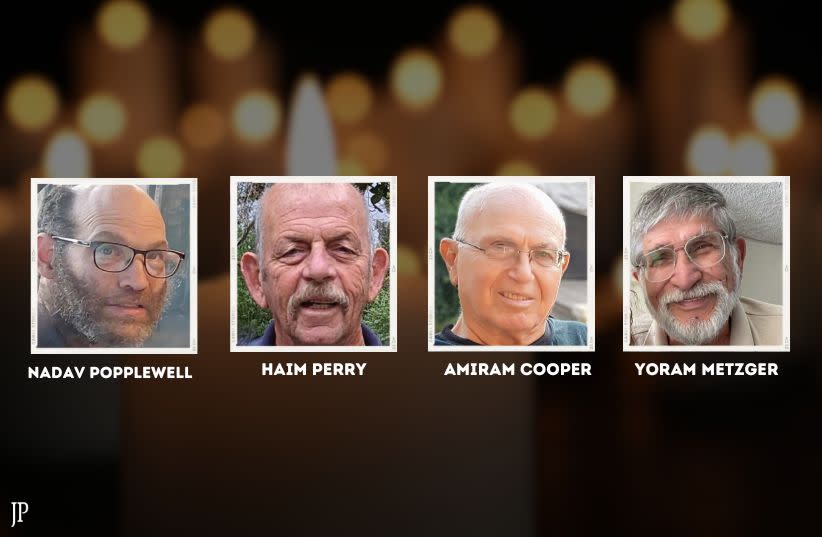Hamas is blocking a Gaza ceasefire and hostage deal, US State Department spokesperson Matthew Miller said as the death of four captives was announced and Israeli politicians Monday sharply debated the next steps in the war.
“To be clear, the roadblock right now to a ceasefire is not Israel: The roadblock to a ceasefire is Hamas,” Miller stated.
He lashed out at the terror group as Washington and Jerusalem waited for it to respond to a three-phase Israeli proposal, which US President Joe Biden unveiled publicly on Friday.
'Hamas is at fault'
“The world should know, the Palestinian people should know, that the only thing standing in the way of an immediate ceasefire today is Hamas,” Miller said.
The proposal on the table is nearly identical to what Hamas said it would accept just a few weeks ago, Miller said, adding that it is now time for it to act.
“It is time for them [Hamas] to accept the deal. It is time to finalize this agreement and put an end to the suffering of Israelis and Palestinians alike,” he said.
Hamas should “not move the goalposts now and try to walk away from it,” Miller stated.
He spoke as the IDF announced the death in captivity of four of the remaining 124 hostages seized on October 7; Nadav Popplewell, 51, Amiram Cooper 84, Yoram Metzger, 80, and Chaim Peri, 80.
Their deaths were a sharp reminder of the human cost of the delay in making a deal, an argument relatives of the captives and the Hostages Families Forum have made daily with protests demanding a deal now, even if it means ending the war.
Netanyahu pushes back
Right-wing politicians and sectors of the Israeli public have feared that the latest deal asks Israel to abandon its military goal of defeating Hamas, a charge that both Prime Minister Benjamin Netanyahu and the US have denied.
Netanyahu pushed back at the critics, explaining that the deal on the table can move forward without an immediate Israeli pledge to end the Gaza war.
"We are working in countless ways to return our hostages,” the prime minister said, adding, “I think about them constantly, about their families and about their suffering.”
Far-right coalition partners Otzma Yehudit and the Religious Zionist Party threatened to bolt the government should it approve any agreement that demanded a premature end to the war.
Netanyahu argued in public and in private that Israel has gone a long way to return the hostages, “while adhering to the objectives of the war, first and foremost the elimination of Hamas.”
Israel is “insistent that we will achieve both” the return of the hostages and the destruction of Hamas, he said.
“This is part of the outline” Biden presented and “not something that I have just added because of coalition pressure. This is something that we agreed on in the War Cabinet unanimously,” Netanyahu said.
He issued similar statements in a closed-door session of the Knesset Foreign Affairs and Defense Committee, where according to a source, he said that “Israel does not commit to ending the war before all of its goals are achieved.”
Netanyahu reiterated Israel’s three goals: to destroy Hamas, to free the hostages, and to ensure that Gaza would no longer pose a threat to Israel.
According to a source, the prime minister said that "there were gaps” between the Israeli proposal and what Biden outlined on Friday, in that the president had not described the entire proposal.
Biden outlined a three-phase plan, that would see the release of all the live hostages in the first two phases. The first phase, which would last for six weeks, would include a temporary halt to the fighting and the withdrawal of IDF soldiers from populated areas of the enclave. Women, the elderly, ill, and infirmed would be freed in this phase, in exchange for an unspecified number of Palestinian security prisoners, while the remainder of the captives would be released in the second phase.
An Israeli official explained that on the 16th day of phase one, negotiations will begin on phase two of the deal.
“Indirect negotiations will begin between the parties in order to formulate an agreement on the terms for the implementation of phase two of this agreement no later than the 16th day,” the official said.
Biden on Friday explained that phase two did involve a permanent ceasefire but that talks were needed for the start of that phase.
“There are a number of details to negotiate to move from phase one to phase two. Israel will want to make sure its interests are protected,” the president said in his Friday speech, but he did not outline what those were. Israel, according to the official, will insist that the implementation of phase two will begin only after an agreement is reached on the terms of the cease-fire.
Since talks for phase two could continue past the six-week timeline, the official explained that according to a clause the War Cabinet added to the proposal, Israel retained the right to resume its military campaign against Hamas, if it gets the impression that “negotiations are futile and serve only to bide time.”
In a virtual briefing, US National Security Communications Adviser John Kirby told reporters that Biden backed Israel’s goal of destroying Hamas and that “nothing’s changed about that.”
He reiterated that Hamas had been given a written copy of the text on Thursday night and had yet to respond officially. In the past Hamas has insisted that Israel must agree to a permanent ceasefire before any hostages would be released. The US and Israel are hoping that the terror group would willing to move forward with phase one and leave that question to phase two.
Hamas “ought to take the deal,” Kirby said, adding that the agreement gives them what they want, which is a halt to the fighting and, over time, an Israeli withdrawal from Gaza.
Kirby rejected reports that the US had changed the Israeli proposal or that there were gaps between what Biden presented on Friday and what Israel had accepted.
“All I can tell you,” Kirby said, is that “this proposal is an Israeli proposal. It is the result of intense diplomacy between our two teams. The president characterized it accurately and now it's up to Hamas to accept it.”
Biden went public with the details of the proposal on Friday, Kirby said, "so that the whole world can see what was in here” and “how seriously Israel was taking this.”
The proposal
It’s a good proposal, Kirby said, explaining that it gives Gaza “six weeks of peace, it gets us hostages out, it gets us the ability to negotiate for phase two, which we get all the hostages out and a potential cessation of hostilities. “This is, as the President said in his speech the best way to end this conflict,” Kirby said.
Both he and Miller noted that now is the time to move away from a military solution to Hamas’s threat against Israel and seek a diplomatic solution, including a day-after plan for Gaza.
Israel has “militarily degraded Hamas to the point where they can't right now conduct another October 7,” Kirby said.
Let’s get "phase one” out of the way and move onto phase two and a permanent cessation of hostilities,” he said.
Miller also addressed that point, explaining, “We don't think this idea of total victory where you pursue a military campaign in perpetuity, with really no end in sight, is something that's in the security interest of Israel. it's obviously not in the interest of the Palestinian people.”
The time has come to use diplomacy to ensure that Hamas will not continue to govern Gaza once the war is over and to begin to discuss alternatives for the day after.
In a brief summary of its meeting, the FADC reported that Netanyahu said that Israel is examining several alternatives to a civilian administration in Gaza that could be put into practice in the near future in the northern part of the enclave.
With respect to the Rafah crossing between Egypt and Gaza, Netanyahu said that the passageway for goods and people would be managed jointly between Israeli and Egypt, a solution which Cairo has rejected.
An FADC discussion was also held on the possibility that the PA security forces would turn on the IDF rather than working with it to maintain calm, and prevent terror attacks in the West Bank.
FADC Chairman MK Yuli Edelstein brought up safety issues in the northern part of the country which has been under Hezbollah fire since October 7, suggesting that funds be reallocated to help secure communities in that region that were not evacuated.
Edelstein also called for funds to be made available as soon as possible to bolster Israel’s eastern border with Jordan. Both he and Netanyahu emphasized the need for better border protection for seamline communities located near the West Bank, which have been under attack.
National Security Adviser Tzachi Hanegbi and military secretary Brig.-Gen. Roman Gofman also took part in the discussion.


